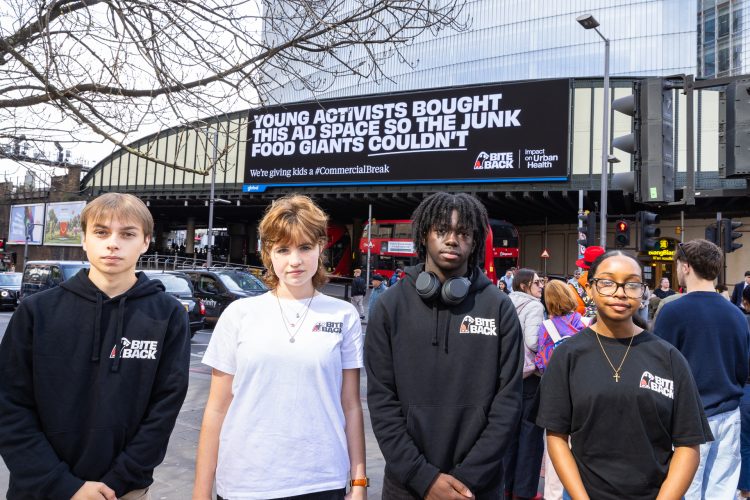Ad giants ‘silence’ youth-led campaign against junk food advertising
Posted: 26 June 2025 | Ben Cornwell | No comments yet
Bite Back’s award-winning anti-junk food advertising campaign has been blocked by JCDecaux and Global, sparking censorship claims from the young activists.


Young campaigners from Bite Back have accused the advertising industry of “outright censorship” after JCDecaux and Global blocked their award-winning billboard campaign challenging junk food marketing to children. Credit: David Madden Photography
Two of the UK’s biggest outdoor media owners have blocked a youth-led anti-junk food advertising campaign, despite its full regulatory approval and recent national acclaim.
Young campaigners from Bite Back have accused the advertising industry of “outright censorship” after JCDecaux and Global blocked their award-winning billboard campaign challenging junk food marketing to children.
The “#CommercialBreak” campaign was set to run across South London, replacing junk food adverts with the message: “We’ve bought this ad space so the junk food giants couldn’t — we’re giving kids a commercial break.”
JCDecaux’s reversal came just days before the ads were due to launch, despite the campaign being fully compliant with Committee of Advertising Practice (CAP) rules and fresh off winning the Sheila McKechnie Foundation’s Best Consumer Campaign award.
17-year-old Farid, a youth activist from Manchester and campaign spokesperson for Bite Back, said:
I can’t believe we’ve just collected an award for our work — and already the industry is trying to silence us. It’s frustrating. But also revealing. We broke no rules or regulations. If they didn’t think our message mattered, they wouldn’t try so hard to keep it out of sight.”
“It’s clear who gets the microphone”
The decision by JCDecaux and Global, who together control around 70 percent of the UK’s digital outdoor advertising impressions, effectively shuts Bite Back out of most high-visibility public spaces.
Nicki Whiteman, Interim CEO of Bite Back, said:
It is increasingly clear that there are industry actors who want to silence youth voices and censor kids from sharing their experiences of advertising bombardment. These refusals feel less like coincidence and more like an industry that wants to conceal the role it plays in harming children’s health. When our ads are blocked and junk food ads are not, it’s clear who gets the microphone.”
The billboard block has drawn criticism from health advocates and transparency campaigners, especially given the scale of junk food advertising in the UK. Research from Bite Back and the University of Liverpool revealed that 57 percent of food and drink adverts in four major UK cities, including Liverpool, Southwark (London), Birmingham and Newcastle upon Tyne, promote high fat, salt and sugar (HFSS) products, with a disproportionate concentration in more deprived areas.
In 2024 alone, food and drink brands spent over £400 million on outdoor advertising, according to Nielsen data. Top spenders included McDonald’s, Coca-Cola, KFC, Mars, Mondelez and Red Bull.
Farid added:
Our campaign is bold, standing up to the biggest players in the food system with truth and courage. The changes we’re calling for are about more than just ads. They’re about holding junk food companies accountable and shifting the balance of power towards policies that actually prioritise young people.”
Follows UK government ad ban delay
This dispute comes as the UK Government announced a delay in implementing a long-promised ban on junk food advertising targeting children. Initially set to take effect in October 2025, the legal restrictions have been postponed until January 2026 following intense lobbying from the food and advertising industries.
Ministers have agreed to revise the scope of the ban after large corporations raised concerns about so-called “brand-only” adverts. These are promotions that showcase corporate branding without featuring specific HFSS products. As a result, brand-focused advertising will now be exempt from the rules.
While some companies have pledged to comply voluntarily from October, there is currently no legal obligation to comply until the new year. The move has been heavily criticised by health groups who argue that delaying action only deepens the impact of unhealthy marketing on young people’s diets.
Campaign support
Support for Bite Back’s mission continues to grow, with some food and drink brands increasingly vocal in their backing.
Alex Wright, CEO of DASH Water, commented:
At DASH, we’re proud to support Bite Back and their bold campaign against junk food marketing. The fact that they’ve just won the Sheila McKechnie Award speaks volumes. Young people deserve better than a constant stream of adverts that put profits before their health.”
Bite Back is now calling on the Government to protect public health by enforcing advertising reform and tackling the lobbying influence of junk food giants.
New Food approached JCDecaux and Global for comment on the decision to pull the advertising campaign. JCDecaux declined to respond, while Global had not issued a statement at the time of publication.









